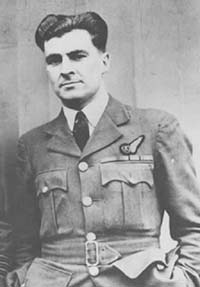
This year marks the 80th anniversary of an outstanding act of bravery for which Sergeant Norman Cyril Jackson was awarded the Victoria Cross.
Jackson joined the RAF volunteer reserve in 1939 as a classified fitter (engines). However, he preferred to be in the air. Jackson retrained as a flight engineer and, in 1943, joined the 106 Squadron, which was based at RAF Metheringham. A year later, Sergeant Jackson completed his tour of 30 sorties on the 24th of April 1944 and was due to return home. However, because he had flown one sortie with a different crew (filling in for an ill flight engineer), he wanted to fly once more with his usual crew so that they could all finish their tour together.
Jackson’s 31st sortie took place on the 26th of April 1944 aboard Lancaster ME669 “Z-NO”. The target was a German ball bearing factory in the city of Schweinfurt. The bombs were dropped successfully on target, and the Lancaster began climbing out of the target area.
Suddenly, a Focke Wulf 190 attacked the aircraft. The Lancaster sustained multiple hits, causing a fire on the starboard wing dangerously near a fuel tank.
As the flight engineer, Jackson volunteered to tackle the fire. After strapping on a parachute and tucking a fire extinguisher into his flight jacket, he climbed out of the escape hatch in the cockpit’s roof. Upon climbing out, his parachute spilt out into the cockpit. Some crew gathered the parachute and gradually fed it out as Jackson crawled towards the fire.
Buffeted by winds of 200 mph, Jackson slipped and managed to grab onto the air intake on the wing but lost the fire extinguisher. Despite Jackson’s best efforts, the fire couldn’t be extinguished, and he received significant burns to his hands and face.
The German fighter soon returned and attacked the aircraft again, scoring hits, two of which struck Jackson in the leg, forcing him off the wing. The Lancaster could not be saved, and the crew bailed out, four of whom survived.
Jackson fell 20,000 feet with his parachute burning and holed by the bullets. Fortunately, the parachute slowed his descent enough to save his life, although he still landed heavily, breaking his ankle.
Jackson then managed to crawl to a nearby German village, where he was taken prisoner. The airman spent the next ten months recovering from his injuries in a German hospital before being transferred to Stalag IX. He attempted to escape twice, the second of which was successful and he made contact with an American division.
It wasn’t until the end of the war, when Jackson’s surviving crewmates returned to Britain, that his heroics came to light, and he was nominated for the Victoria Cross.
Sergeant Jackson’s citation concludes:
“This airman’s attempt to extinguish the fire and save the aircraft and crew from falling into enemy hands was an act of outstanding gallantry. To venture outside, when travelling 200 miles an hour, at a great height and in intense cold, was an almost incredible feat. Had he succeeded in subduing the flames, there was little or no prospect of his regaining the cockpit. The spilling of his parachute and the risk of grave damage to its canopy reduced his chances of survival to a minimum. By his ready willingness to face these dangers he set an example of self-sacrifice which will ever be remembered.”